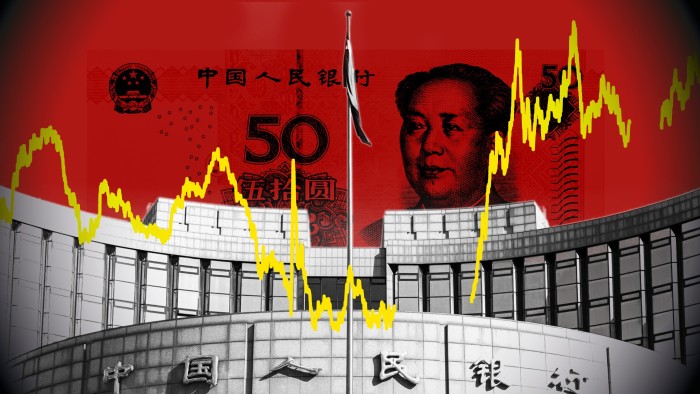The release of China’s second-quarter growth data this week embodied a dilemma for the country’s policymakers: real economic expansion was strong and steady at 5.2 per cent but widespread falling prices meant nominal growth was much weaker, at 3.9 per cent.
Solid real growth reflects the expansion of Chinese industry and exports — but nominal growth is what Chinese workers feel in their wage packets and Chinese companies see on their revenue line.
It also means that interest rates, when deflation is taken into account, are much higher, leading to an ongoing, contentious debate about whether China should follow the path of western nations and adopt a zero interest rate.
“We don’t think that there is a consensus among politicians and policymakers that zero interest rates in China could happen,” said Helen Qiao, Greater China chief economist at BofA Global Research. “But most policymakers, as well as the market and investors, are gradually accepting the fact that interest rates are going quite low.”
Two historic precedents loom large for China, according to multiple academics and state-affiliated policy experts.
One is the zero interest rate era in the US and Europe, post-2008, which is seen by some in Beijing as a profligate event that inflated asset bubbles and destabilised markets.
The other is Japan’s decades of stagnation after its real estate bubble burst in 1990 — an experience China would like to avoid. Its own real estate slump has dragged on since 2020.
This divergence in views has become a block for Chinese monetary policymaking, and the timing of any shift may hinge on economic and tariff decisions from the US, with Beijing keen to hold policy firepower in reserve so it can respond.
One camp wants China to drop rates fast, which would enable heavily indebted local governments to refinance and boost public investment.
“A zero interest rate should not be unthinkable. Even if it can’t go all the way to zero, there’s still room to cut at least 0.4 percentage points to align with the fiscal plan,” said Gene Ma, head of China research at the Institute of International Finance.
The central bank’s benchmark seven-day reverse repo rate, following a series of gradual cuts, now stands at 1.4 per cent.
“China still has significant space for public investment to reach its potential growth. A deeper rate cut, combined with fiscal expansion, could help unlock that,” said Ma.
The yield on China’s 10-year government bond has been hovering around 1.7 per cent, near historic lows, suggesting investor expectations of persistent disinflation.
A second camp in Beijing opposes a formal zero-interest rate policy. Its biggest concern is the banking sector. China’s lenders rely on the net interest margin, the difference between their borrowing and lending rates, for profitability.
The average interest margin at China’s top six state lenders fell to 1.48 per cent in the first quarter, its lowest level on record, compared with more than 2 per cent in 2021.
Zero interest rates would further compress bank margins at a time when many are already facing deteriorating asset quality and rising defaults in the property sector.
“The ultimate question, which one would ask before making the decision [to adopt zero rates] is: what to do with millions of depositors who rely on the interest of their massive banking savings?” said one adviser familiar with the debate. “It’s not an economic question, but a political one.”
Some advisers argue the country already has a de facto zero interest rate regime, since Chinese banks — guided directly by the central bank on loan pricing — have steadily lowered borrowing costs over the past few years, limiting the impact of further cuts.
“China’s monetary policy is already very close to a zero-interest rate policy,” said Chen Long, co-founder of Beijing-based consultancy Plenum. “For households and enterprises, the interest rate environment is currently about the same as that in the US when the Federal Reserve conducted its zero-interest rate policy.”

Opponents also warn that zero rates could distort the economy over the long run and worsen China’s challenge with overcapacity.
“China is at a juncture with overcapacity problems on the supply side and lack of sufficient domestic consumption on the demand side. Zero or negative rates could further deteriorate the supply-demand imbalance, as investment would be more sensitive to rates than consumption,” said Zhi Xiaojia, chief China economist at Crédit Agricole.
Households, scarred by the property downturn and lingering uncertainty over the country’s economic outlook, continue to build their precautionary savings, with household deposits reaching a new record of Rmb147tn ($20tn) in June.
The prospect of a further rate cut has prompted many savers to lock in higher interest rates. At most Chinese banks, the interest rate on demand deposits is 0.05 per cent, while one-year term deposits yield less than 2 per cent.
“It is evident right now that the low interest rates not only fall short of delivering the intended purposes such as boosting consumption, but would also exacerbate the very issues policymakers sought to address,” said Richard Xu, an analyst at Morgan Stanley.
Behind the scenes, the People’s Bank of China has turned its attention towards scenario planning. It has quietly sought guidance from European institutions with experience in managing a prolonged low-rate environment.
As the debate grinds on, a larger question looms: can the Chinese economy afford the cost of delay?
“Without a strong policy stimulus, it’s hard to escape the ongoing deflationary spiral,” said Larry Hu, China economist at Macquarie in Hong Kong.
Read the full article here




